Leagioan News Agencies
-

Alliances Form-Up for EU Commission Elections and NC Primaries / Special Senate Elections to test PAP
As the elections for the European Union Commission come closer and closer each day, another type of election is on the way at the same time that is becoming very heated and competitive within the Commonwealth of Leagio. Under the current poles at the moment, for the race to become Premier Commissioner of the European Union EPA candidate Juncker is in the lead with a seven point difference against his current competitor Calvin Kühnert. The former Internal Affairs Commissioner has seemed to at the moment revive the potential of maybe having a huge majority for Leagioan vote with current poll showing him in the lead having 48% while his opponent has 41% of support within the Commonwealth. However, EPA candidate for Premier Commissioner is going to have to work hard to attain the boat as there is still 11% of the population who have not decided at the moment who to vote for and that 11% will be enough to swing the election for Premier Commissioner in either Juncker or Kühnert; however is still too soon to tell as there is still at least two weeks ago until the final vote comes in with early voting to begin on July 20th and plus there is still time for more candidates to register into the race for a position within the European Union Commission. In the last race for Premier Commissioner that Juncker took part in was where he was able to win the Leagioan vote but not by a huge majority against the other candidates lasts year. Many political pundits that are familiar with the voting attitude within the Commonwealth Leagio feel that it might be possible that former Commissioner Juncker might possibly get the votes needed but he's really going to have to work for it. In the race for the Foreign Affairs Commissioner position, there is only one candidate registered to participate in the election and that is Antoni Reynels from Inquista. It might be possible that he will be the only candidate running for the race and he will most definitely went but the question is how much of the Leagioan vote will he receive as that will be most likely a referendum to his position. In the race for Internal Affairs Commissioner, Kevin Cotilla is facing off against the incumbent Ilmaras Kalessed from Republic of Istkalen and at the moment it seems that he might win as the preferred candidate. Many polls show him in the lead with either either 5 to even 12 points in the lead against the incumbent. However, even though the incumbent Commissioner Ilmaras Kalessed is not doing well on the favorability polls for voters in the Commonwealth, there is still a huge percentage of the Leagioan voter base that is undecided and it could shift the election to either candidate.
At the same time that these elections were European Union Commission is taking place, the Commonwealth is also having its own sort of election that is being very significant and will be a predecessor to the election that will occur for the National Congress this December. House of Councilors in particular is of very importance to the President of the Commonwealth Ran Mouri-Kudo as that is the house and where she can be able have a working government under with a prime minister that she can be able to work with properly. This July is gimme the testing grounds for support to the President under the new revised vision to the Constitution of 2020, the National Congress with the Senate in particular will be having a election for the new seats that have opened up for the transition of all the territories within the Commonwealth to become states with full representation of six senators within the Senate. Before the revised Constitution came into effect, there were nine territories with each having four senators within the Senate of the National Congress. Now at the moment, those territories will be having two additional senators as by the provisions of the revised Constitution and the president is taking a hard campaign with members of her party, the Progressive Alliance Party. In addition, a new state was created out of one of the other states of the Commonwealth called the State of Kyiv which is based around all the rural and urban districts of the Kyiv sector of the state of Huttson. This means that an additional six senators will be added to the Senate of the Commonwealth with three being elected directly at the moment and the every three being elected through a list that the State Constituent Assembly of the new state has approved where the states voters will decide through a single transferable vote on which candidates to approve and will be directly afterwards approved by the State Constituent Assembly.
At the same time that these elections will take place, an additional election is being held called a primary election; this is the type of election that will select the party candidates for each of the constituent districts that will be represented within the House of Councilors. The candidates that will win in these primaries will then face off against their opponents in the districts that they will run for. Another part of these primary elections is for the list sector of the House, where party voters will get to decide on the list-candidates that will run within each state and their place within the list. Number of candidates that will be on each list will be dependent on the following conditions:
-
The number of list seats that state or territory will have in the house
-
Whether or not that the party that the candidate will represent is currently under an alliance
Before this month there was only one electoral alliance that had formed after the adoption of the revised Constitution of 2020 and that alliance is the United People's Front lead by James Moriarty from the state of Freedonia. After the announcement of the primary races and the EU commission election, new political alliances have been announced by various political parties:
-
Social-Progressive Alliance was the first alliance announced this month to be formed with it including the Social Democratic Party and the Progressive Alliance Party, where the president made the announcement in front of live television at a social gathering and charity last week. The president announced that the two parties would form a three-person collective committee to act as the executive leader of the alliance with each party nominating a leader and an additional one to act as a mediator.
-
Hope for Leagio was the next alliance that would be formed led by former President Kenneth Lifejumper, who two months ago announced that he had switched his political affiliation from the Civil Populist party to the Free Democratic Party. This alliance not only includes the Free Democratic Party but also the Civil Populist Party's old ally the Eastern Leagio Party and also the relatively municipal level Leagioan Democratic Union. This alliance that formed last week as well announcing their platform that they focus on building a new political atmosphere that shifts away from the dramas that occurs within the European Union and intends to focus on a mainly isolationist and free-market platform. Although there has not been a president nominated for the alliance, former President Lifejumper endorsed the EU-Councilor for Leagio, Lionel Morel, as a potential candidate.
-
The Conservative Reform Party, the Civil Populist Party, and the Christian Democratic-Republicans announced this afternoon that they had formed the Republican Future Alliance as more or less a alliance to combat against the ideas of the president, the prime minister, and their allies. Many Leagioan political pundits call this alliance a shaky one at best that seemed to be formed more or less as a catch-all alliance on one goal and that is to block the moves, legislation, and the abilities of President Mouri-Kudo. The current spokesman for the alliance announced that this week an election between the parties would be held in nominating a candidate for not only Prime Minister of Leagio but also president of the RFA.
-
-

EU Commission and Senate By-Elections Results
After almost 18 million votes and around 80% of the voting population cast their votes, the election for the EU Commission and the Senate By-Elections came to a end. Many of the polls near the end of the election predicted a win for sure for Kevin Cotilla, but there was not as many hopes for Juncker. Leagioan political pundits seemed concerned that the EPA Premier Commissioner Candidate might not win with a strong mandate as he had in his first time, but it remains to be seen as the final votes were counted. This afternoon after the voting period had ended, the results for the EU Commission and Senate By-Elections have arrived. Under the revised Constitution of 2020, all the territories within the Commonwealth were granted immediate Statehood with full representation within the Senate. A provision within the Revised Constitution stated that on this EU Commission Election, the new seats for at least the 2024 class of the Senate will be elected through a large-scale by-election. Each senate seat is elected by Single-Transferable-Voting System within each state. Most of these new states have been speculated to be strong United Peoples Front states where the Socialist Union Party and the Green Party in particular of the political alliance will gain the seats. However, in order for Mori-Kudo to have a Progressive Senate, her party would need to have 62 Senate Seats. When asking members of the Party on their confidence of attaining the needed seats, they did not seem sure as if the party itself felt that they would not have the chance to keep its majority for long. When we talked to James Moriarity, President of the United Peoples Front alliance, he said that he seemed sure that in terms of percentage of seats, he felt confident in the alliance at least gaining a couple of points. He explained that the alliance did not put much effort into this election as a method to save political and popular energy for a strong push in the Full National Congress Election taking place this December where the Alliance wants to try and gain at least a plurality of the seats there. First results that was announced for viewing was the position of Internal Affairs Commissioner.
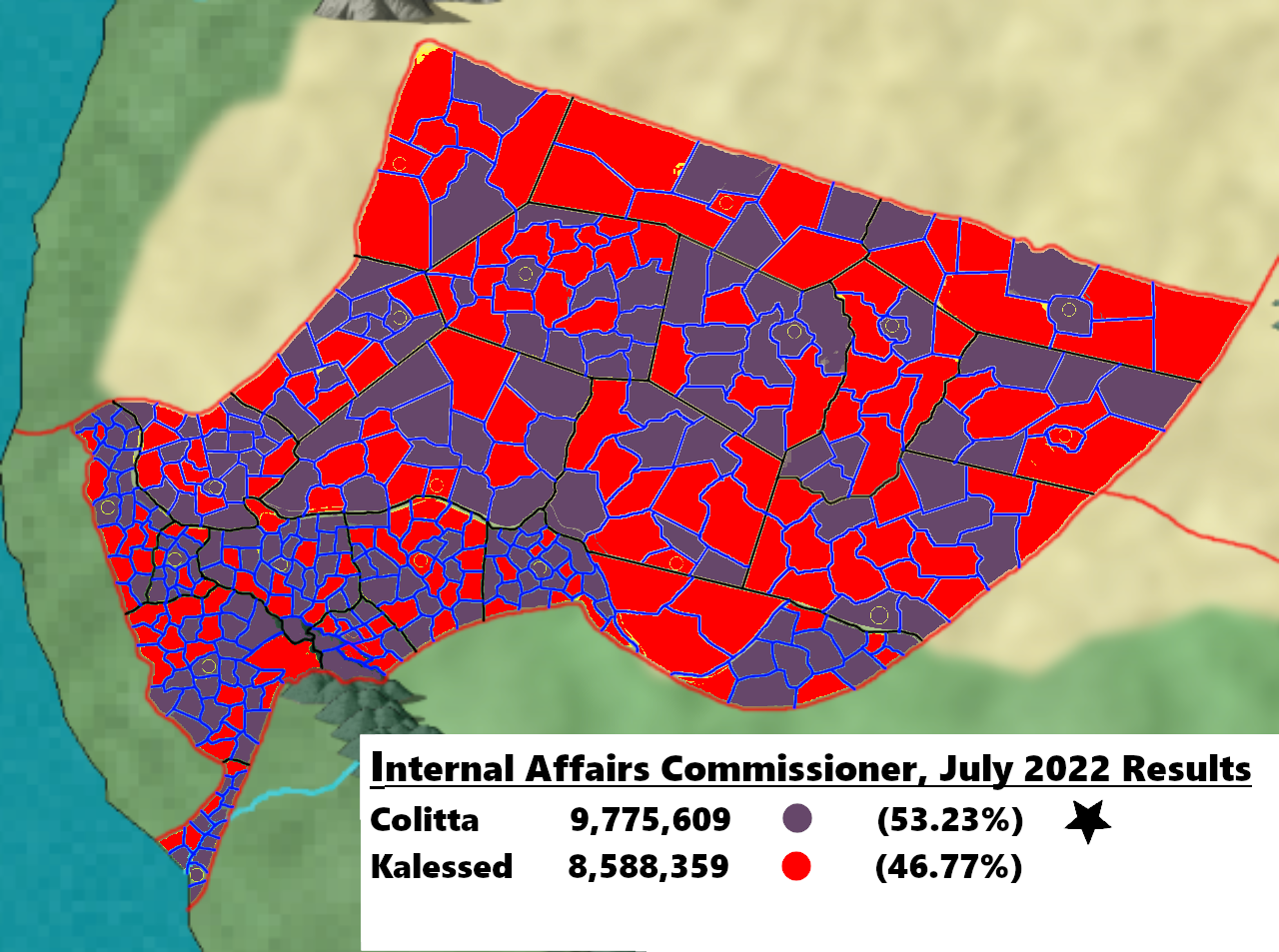
In this race, Kevin Cotilla is the winner by nearly 6.5 point lead against the incumbent by gaining an upper hand in this race by gainingg the support of the Urban and Surban vote of the Commonwealth, while the Incumbent managed to snag the Rural and more Eastern vote of the Commonwealth. Next the result for the Premier Commissioner election between Juncker and Kühnert, where by the end of the race the polls were showing a very close toss-up for either candidate when calculating a margin of error. Now the people of Leagio and the European Union will get to see the results as they are announced:
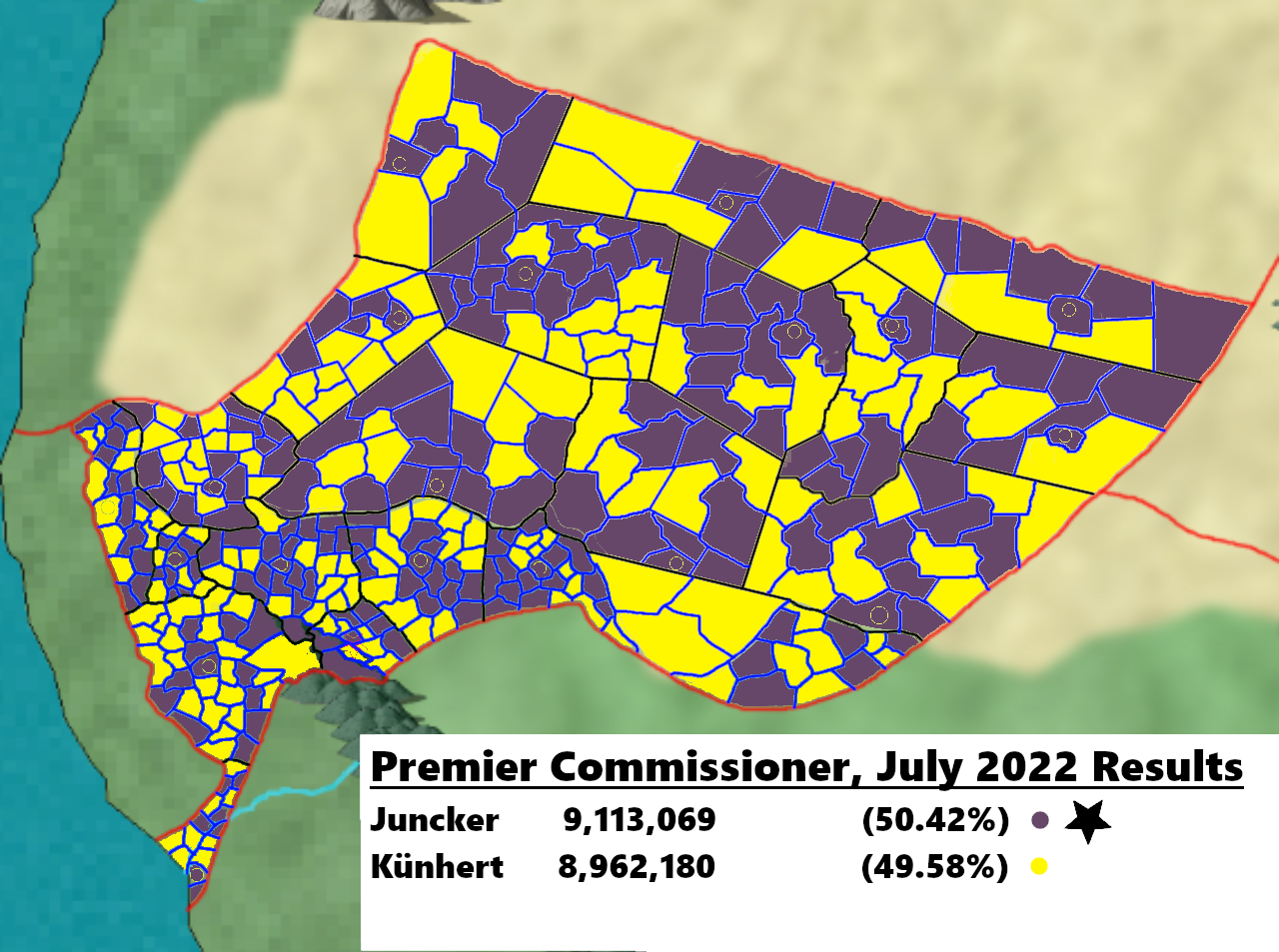
Surprisingly the race was closer than previously thought as the results showed that EPA candidate Juncker is the winner by less than a percentage point or 200,000 votes. It seemed that polling showed that the voters in the Commonwealth were seeing both candidates as similar and unable to decide on the best one with Juncker just barely having a majority. For sure this race for Juncker in Leagio is not mandate, but if he wins in general and runs again for the position then he might be able to gave a stronger lead by then where the December Elections will then take place. In the Foreign Affairs Commissione, since there was only one candidate running, we can safely say that Antoni Reynels won. Now we will shift to the Senate By-Elections, where there were 22 seats up for grabs in this race where the seats that were created for the Class of 2022 were also elected.
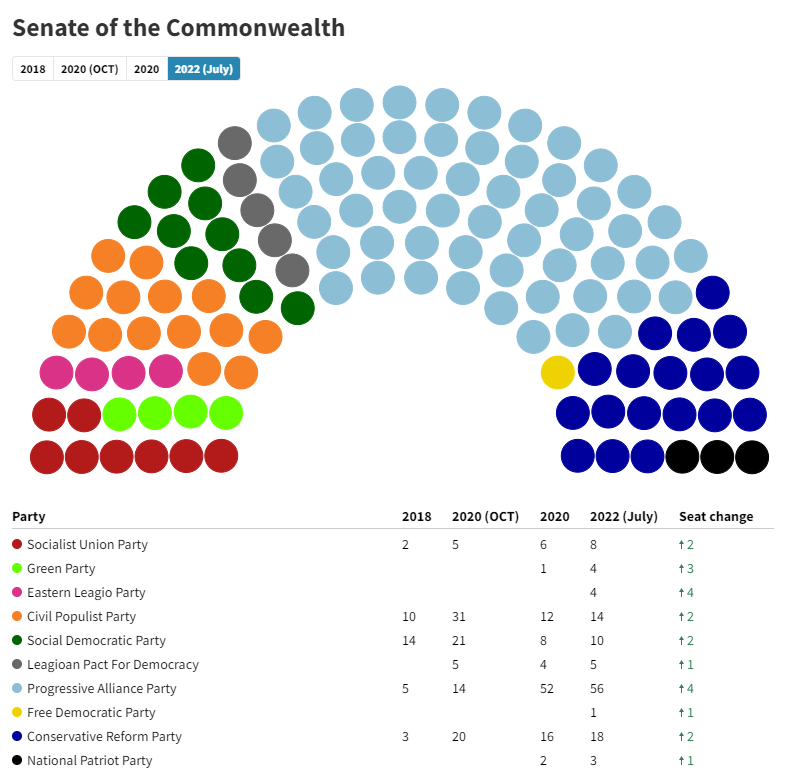
When focusing on the United Peoples Front, the SUP and Greens got the five seats that UPF President Moriarty predicted which gives them a larger percentage of the seats in the Senate. Mouri-Kudo's party, the Progressive Alliance Party recieved more seats than predicted by pundits with having a total of 56 seats but that is not a majority and means that PAP does not have control of the Senate that it had enjoyed. However, with the coalition of SUP, PAP, and GP, there is a control with the Government of Lahaye at the moment by 6 seats in majority. However, the questions that people have been asking is will that hold for December as well or can Mouri-Kudo fix this issue by then. Many pundits believe that it will not be possible for any party to have a majority at the moment and whether we will see legislative deadlock again will be unknown for sure. If it does, then talks of removing the Senate might prop up again within the Commonwealth but it will need to be seen for sure. The members of the Republican Future Alliance did gain some seats but considering that in terms of seat numbers, this was a election to gain not lose in numbers only in percentage, then the RFA might be forced to rethink its strategy as considers of party switching within the Civil Populist Party have been heard within the media and if turn then the Civil Populist Party might find itself in a losing position this December, where the Free Democratic party might end replacing it as it gained a seat in the Senate with the CPP's old ally, the Eastern Leagio Party, gaining 4 seats as a strong regionalist party in an alliance with the Free Democrats that might see them rising against the CPP as the new party of the people possibly as it is now led temporarily by former President of the Commonwealth Kenith Lifejumper; who trashed his former party for switching to right-wing rhetoric against Mouri-Kudo over simple foreign policy.
-

National Congress Passes new minimum wage of 11 Sulias an hour
The two houses of the National Congress passed new legislation that will start to take effect in October. Through a series of reforms presented by Prime Minister Lahaye, the National Congress in both houses passed legislation that gave Leagio its first commonly instituted minimum wage act where no matter the position that a person works, their compensation must not be lower than the standard that has now been established. Previously, within the Commonwealth, the idea of a minimum wage was placed on the authority of the states and terrorities of the Commonwealth with it ranging considerably. For example, in the most populous state of the Commonwealth, 17 Sulias was seen as the minimum wage in Huttson with Arlick having the highest at 19 Sulias an hour. Although, there is a deeper contrast in the lower populated states of Leagio with Elsweyr, Sule, and Karpitniz having 9 Sulias an hour. States that have less than a million residents living in them tend to have the lowest minimum wage standards as a way to entice more jobs into their spheres and lower the unemployment rate within them. Beforehand, it seemed unlikely that a Common Law Minimum Wage Act would be adapted as many presidents stated that it was an issue that they felt should be left to the governments of the states and territories. However, this attitude changed after the election of President Mouri-Kudo back in 2021 that ran under the banner of passing a 15 Sulia per hour minium pledge but when elected was unable to from the hold-out of the Civil Populists and some conservative factions of the Progressive Alliance Party that did not support it. Eventually, after getting a government with the United Peoples Front Alliance. Mouri-Kudo and Prime Minister Lahaye were able to get a set-out minimum wage from the conservative faction of the Progressive Alliance Party and got the UPF to agree to the set wage. When asked by reporters on the new focus of her government, Prime Minister Lahaye explained that there is discussion on reforming the tax system of Leagio before the coming elections.
-

Mouri-Kudo Announces Coming Expiration of Treaty of Tullion
As August is in its beginning this year, President Mouri-Kudo announced this evening that in agreement with Prime Minister Lahaye, there will not be any attempts to be made to ensure a renewal of the Treaty of Tullion between the Commonwealth of Leagio and the Kingdom of Ritzmag. An agreement that was formed between Prime Minister Bridges and President of Leagio at the time Kenith Lifejumper, where the two leaders agreed to form a trade of free trade between the two nations with other provisions that were strongly negotiated with the two parties. The agreement also covered provisions that included an education exchange program between the two nations with a discount on Leagioan weapons up to 15%. However, ever since the Copalan City Affair, President Mouri-Kudo reduced the discount by executive order down to 5%. This move in particular was one that was constantly debated on whether or not the president has the authority to make such a move or whether or not the move falls in the boundaries of the powers of the National Congress as the legislative branch of the Commonwealth. Many setters of the parties in opposition to Mouri-Kudo strongly urge that the Commonwealth has a duty to continue provisions of the treaty and meet with the Prime Minister of Ritzmag in updating its provisions.
However, Mouri-Kudo announced that she will not be interested in renewing the Treaty of Tullion for a variety of reasons. One of the many reasons that she stated was the fact that tensions between Leagio and Ritzmag in terms of their governments have changed within the past two years since 2020. She continued to explain that the two countries had strong disagreements that made the idea of continuing the treaty nonenforceable. Many critics of Mouri-Kudo stated that such tensions was started by her in the first place when she tried to convince her party members in the Senate under the old Constitution to deratify the treaty but the move failed due to the rising tensions with members of her own party crossing lines on the votes. Another reason that the president explained the need to continue and let the treaty expire was due to the recent events that were shifting within Ritzmag as at the moment they were planning to leave the European Union. Boyko explained that if it comes to fruit that Ritzmag leaves the EU, then the provisions of the treaty will make it very difficult to even more with the current situation ongoing over the Mediterranean Straits issue between Spain and Yosia.
The treaty is set to expire next month, September, where it will bring in a new set of problems for the incumbent President. Under the current terms of the treaty, Ritzmag is allowed to station troops in Leagio within the state of Huttson. In addition, the Kingdom of Ritzmag is allowed to station no more into vessels within the harbor of Port Hilson. At the moment, there are no Ritzmag naval vessels within the harbor with the issue of the base in the state of Huttson raises concerns about a potential crisis between two governments. When asked about the concern raised by the press, Mouri-Kudo explained that she would be willing to give the troops than time to leave that is acceptable to the Prime Minister of Leagio. However, critics of Mouri-Kudo still issue concerns that this become a potential crisis between the two nations that could've been avoided.
-

Mouri-Kudo Against Elthize & Leagio Unification in Response Elthizic Supreme Court Ruling
In Elthize, the recent news about the case of Gresham v. Elthize in the Elthizic Supreme Court had been a wake call for Leagioan voters as the ruling in the Commonwealth's neighbor travel in that the political party known as The Unitees in Ethlize was declared to be a legal political party that should not be suppressed by the Elthize government. The reason for the suppression was the fact that the party, The Unitees, support the idea that Leagio and Elthizic should be united as one nation. In Elthize, the idea of merging is not strongly supported and in the Commonwealth, the same opinion can be said the same thing. In recent polling done weeks previously, only 4 % of Leagioans support the idea of admitting Elthize into the Commonwealth, while 38% are against it and the rest are not sure on their own stance to the matter. Few political parties actually take an active stance in support of the idea and some have stuck to it, especially after the release of the ruling of Gresham v. Elthize. The only party in support of the idea has been the far-right National Patriot Party, while the United Peoples Front and Social-Progressives (President Mouri-Kudo alliance) have strong come out against the idea. President Mouri-Kudo when asked on her opinion on the ruling, she stated this to the press:
"While it is indeed surprising on the specializations of the ruling within Elthize. However, this ruling does not change my stance on the matter that I am against and will never willingly support the idea of Leagio and Elthize merging into one nation or admitting Elthize as a state into the Commonwealth. Elthize has had its independence and sovereignty for many years, which I think should continue. Furthermore, the idea of it would be unconstitutional to the EU Constitution that the Commonwealth ratified as we joined the European Union a couple of years ago. Any party in Leagio that either supports the merging or defends the idea is willing to test the limits of democracy in exchange for the creation of tyranny on a people, which is against the principles of founding President Hudson when he wrote the first constitution of the Commonwealth."
-

Lahaye Cabinet Tackles Teacher Shortage in Leagio
Education in Leagio has been constantly shifting as days went by through many administrations. The Lifejumper Administration instituted more forms of testing like LEYE (Leagioan End of Year Exam) on various subjects such as math, science, and Leagioan History. The Ariza Administration before hand instituted stronger requirements on certification on teachers like taking the National Teacher Ethics Test and Strategy Implementation Test. The Sardou Administration back in 2007 implemented the adoption of the Specialized Education Fairness Act in order to provide better resources to students with disabilities within the classroom. However, the one thing that all of these government administrations failed to focus on was the number of teachers that needed to be hired after each move that they made. Many of these measures required teachers to have more duties to their jobs but did not receive in their eyes good job compensation or pay. The average pay for teachers in Leagio is about 35,400 Sulias or around 54,000 Euros but many teachers have issued complaints that the pay is too low when considering that the school requires them to purchase materials for the students in order to continue employment.
In response to these complaints, the Lehaye Government submitted a bill to the House of Councilors called the Teacher Appreciation and Reform Act immediately into its intiation as a parliamentary government. The Act changed the following:
-
Required that Leagioan School Districts and Systems (both public as well as private that receive any Federal grants) to redistribute the workload on teachers among all staff equally or create new positions for a positive educational environment for all persons in the school system.
-
Creates a national pension system that shall be combined with any state or territorial pension system
-
Creates an Evaluation system for teachers that shall not focus on the LEYE standardized test scores that schools receive
-
Protects any Teacher unions that are formed within school districts and systems
-
Requires that states and territories raise the minimum salary wages of teachers that are new to be 40,000 Sulias, while current teachers receive 45,000 sulias. These new wages will start next school year to allow for districts and systems to begin budgeting.
-
If a teacher's students receive a high average on the LEYE on their tested subject, then they will receive a larger increase on their tax returns.
-
Provides districts and systems with grants for funding, if they are able to show high retention of teacher staff members.
The Act passed the National Congress with strong support with 338 Councilors of 541 in favor and 62 Senators supporting the motion, which was signed by President Mouri-Kudo recently into law. The Civil Populists were strongly divided on the issue as many are from states and constituencies that have high teacher shortages. Although the act does not fix the issue of teachers buying supplies, the act is expected to convince teachers to stay in the classroom and actually feel recognized by the government of the Commonwealth for all of the hard work that they have to do each school day in order to build-up a future for their students.
-
-

Major Alliances Announce PM Candidates and Begins Campaigning
Starting this week, the hardcore campaigning for the National Congress begins as the month of December recently started meaning that the election for the National Congress is up for voting in December 20 this year. In this race, the entire House of Councilors with 533 seats will be up with half of the 123 Senate seats. At the same time, all of the legislature branches of the states of the Commonwealth will be up for election. In the old constitution, the entire National Congress would be up but under the revised 2022 edition, the method had changed where the House will be up for another 2 years and after 2024 will be up at most every 4 years unless when dissolved. The system for the Commonwealth has especially been changed as the House of Councilors has more power as the house needed for a government to be formed and a Prime Minister to be selected.
The main alliances have announced that they plan to hopefully have a majority within the House of Councilors for their own governments, but polls at the moment show that there are only three realistic possibilities that will be coming in December 20th. By now all the alliances have released their platforms for potential voters to read and see, while the campaigning throughout the Commonwealth is being done.In addition, all the alliances hav announced their candidates for a potential Prime Minister of Leagio:
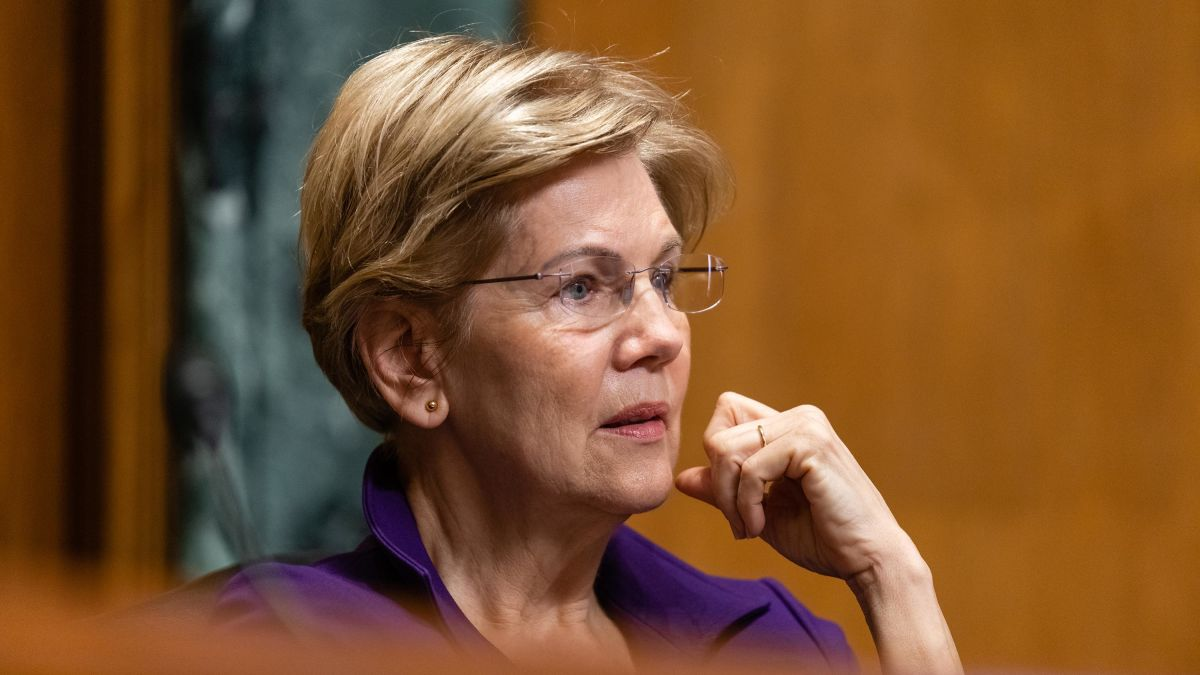
Prime Minister Lahaye during a session of questioning held in the House of Councilors
For the Social-Progressive, Councilor of the Progressive Alliance Party and current Prime Minister Marie Lahaye announced that she was selected to be their candidate with the support of the Social Democratic Party. Prime Minister Lahaye has already positive polling in how she has runned her government in a coalition with the United Peoples Front. She created Project Wayside which was to provide another Deepwater port and harbor on the Commonwealth, which at the moment has turned out to be very successful and coming along well with said project nearly completion in the housing and residential and the harbor is already started with it expected to completed by March next year.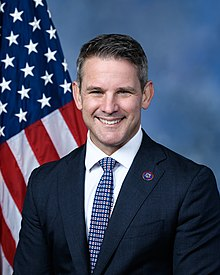
Protriat of Alfred Stone during his time as Loors Minister of Development
Hope for Leagio, which comprises of the Free Democratic Party and the Eastern Leagio party, announced that their candidate for Prime Minister will be Alfred Stone, who was Minister of Development for the now State of Loors under a Civil Populists and Progressive Alliance Coalition government about 15 years ago.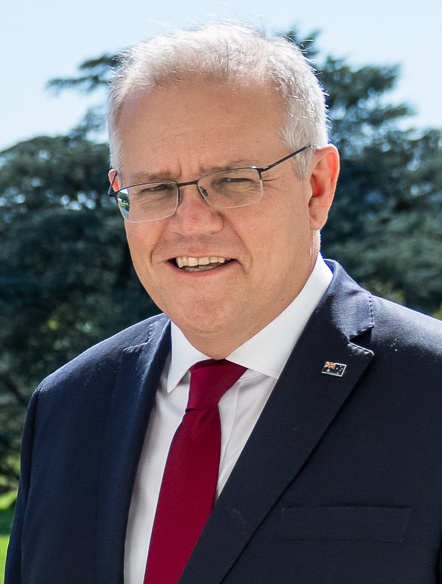

Senator Russel at the top and Councilor Phila at the bottom
The Future Republican Alliance, which compromises of the Civil Populist Party, Conservative Reform Party, and Christian Democratic-Republicans, announced that they will have two candidates as a possible Prime Minister. The Party with the most that the Candidate representatives will be Prime Minister and the other will be Deputy Prime Minister. The Civil Populists announced that they candidate will be Councilor Liz Phila, while the Conservative Reform party announced that they choose Senator Sam Russel to be their candidate.
Councilor Wilhelm Duran sitting down during a debate about the energy crisis
The United Peoples Front alliance had made the decision long before the other alliances in where they selected Councilor and leader of the alliance in the House of Councilors Wilhelm Duran as their candidate. Councilor Duran of Socialist Union Party is a popular candidate for the left wing base of the alliance and voters, where he had been a stronger advocate for daring measures to fight climate change.Recent polling shows that the Leagioan Voter base, in the lower voting age bracket especially, have started to shift from the more conventionally elected parties like the Civil Populists and Conservative Reformists like seen back in 2020 but in higher numbers. As polls have shown that voters might be considering on voting Parties in either the Social-Progressives or United Peoples Front. Although, much deadlock had occurred in the first two years of the Mouri-Kudo administration, President Ran Mouri-Kudo is still a popular president among the young voters but a lot of voters in terms of voting for Congress have shown thought that there needs to be more reform through a socialist practice that had been seen through the coalition government that Lahaye had first formed with the United Peoples Front alliance that included the Socialist Union Party. The question on which of the two alliances will have a majority in the House of Councilors at least is still up in the air for debate as some pundits speculate that there is the possibility that there will be hung House in terms of alliances.
The main issues that have been at the top of many voters according to polling recent is in the top three, which is constant job opportunities available, Health Care Reform, EU Stability, and Energy. Voters list these as the their top issues that many of the alliances and parties have worked to focus on this election season. The Mouri-Kudo Administration with the Lahaye Government had worked tirelessly on these main issues, but voters still feel that more can be done on these problems.
These are the pltform ideas that all the alliances have been campaigning on so far to voters:Social-Progressives
- Stronger investment in public infrastructure and energy, particularly wind and solar.
- Leagioan membership into the Treaty of Telum by 2024
- Creation of a Independent Anti-Corruption Agency
- Establish a more consistent VAT to fund various economic programs
- Institute a nationalized mail system for the commonwealth.
- Tax Breaks for Companies that pay past the minimum wage
Hope For Leagio
- Legalization of Cannabis in leagio
- Support Right to Disconnect through critical legislation
- Introduce a points-based system for immigration into the Commonwealth
- Increase the investment of infrastructure and jobs in the eastern states
- Privatize all business that the Common Government has stakes and control
- Keep the EU-Councilor for Leagio as a elected position
Republican Future Alliance
- Cut down the flow of immigrant refugee’s
- Membership in ECON by 2024
- 1 for 2 regulation system
- Increasing investment in all forms of energy to help the Leagioan Household
- Limit the involvement of the Common Government in the personal affairs of all its states and territories
- Mandate Port Hilson as a Vice Capital via a referendum
United Peoples Front
- Increase Government Spending in welfare as well as public transportation and ban job cuts in profitable firms
- Redevelop the Health Care System to be free for all through increase in taxes for the rich
- Join the Telum Treaty
- Decriminalize Cannabis within the Commonwealth
- Remove all coal and gas power plants and replace them with nuclear plants
- Abolish the Senate
-

Hung National Congress for 2022-2024 / Social Progressives and United Peoples Front agree to coalition government Continuation
After much counting by the Common Election Commission, the results of the National Congress were released and had surprised many bundit on the division that was noticed. When focusing on the results of the House of Concilors, the winner by a plurality was President Mouri-Kudo's Progressive Alliance Party but only by 5 seats. In the election, the Progressives had lost 98 seats from the 223 that it had from 2020. Although, the lost was made up by the alliance with the Social Democrats which got 62 seats this year from the 36 that it in 2020. However, even with the alliance Mouri-Kudo formed early this year, the President would still need additional 80 seats for a mainly Social Democrat-Progressive government with a Prime Minister that does not have be concerned deeply about many partners in a coalition government running the country. However, this type of situation would have to happen if President Mouri-Kudo wants to continue getting her program done and be re-elected in 2024 with hopefully a rebuilt and refocused Progressive Alliance Party. As the issue that many pundits are suggestion as to why Mouri-Kudo lost so many seats was the fact in that this year the number of registered voters increased and the United Peoples Front alliance, which contains the Socialist Union Party, the Green Party, and the Social Workers Party. The UPF worked teniously since its foundation to be more appealing to voters and moving away from its radical voice that it had early in Leagio's entrance into the European Union. This work certainly bore fruit as the UPF gain 174 seats altogether. Mouri-Kudo currently already has a coalition government with said alliance and there were some members of the Progressive Alliance Party hopping to be able to gain enough seats to get out the coalition with the Socialist Union Party in particular. However, said a dream will not be possible at all. Mouri-Kudo could try with the Civil Populists and Conservative Reformists but it is strongly doubted due to the memories from the previous coalition government (with the Civil Populists) that she had with them where it was unworkable and that situation had took its toll on the Civil Populists this year as they lost even more seats where they had 88 seats and went down by 56 to 32 and if the trend continues then they might fall into the category of being below the 2% national theshold needed to gain a seat in the House of Councilors and the Conservative Reformists lost some seats but mainly to the new Free Democratic Party that gain traction with a alliance with the Eastern Leagio Party.
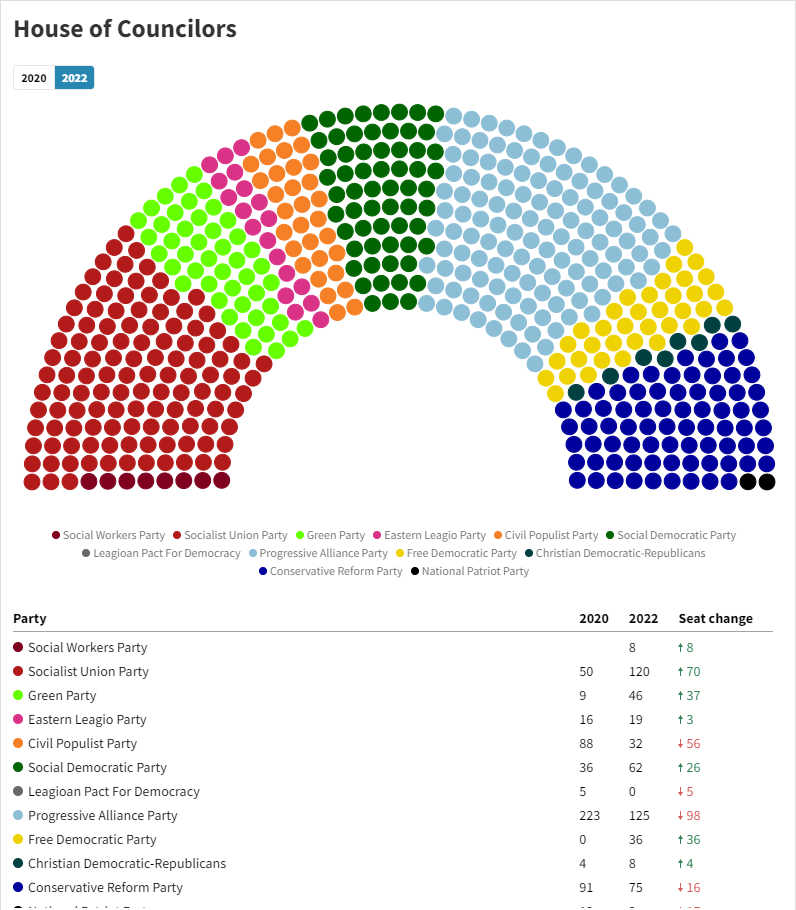
If Mouri-Kudo wants to have Lahaye continue as Prime Minister and be able to achieve some of her campaign promises instead of none, then Mouri-Kudo would have to continue the Coalition government with the UPF but now with the Social Workers Party and the PAP's alliance partner the Social Democractic Party in order to have even a functioning government, but more cabinet positions would have to been given between all member parties in the government (although, the Social Workers Party would not be able to get any as they have only 8 seats which not be enough to gaining a important seat in government).
Not long especially after the release of the results, the Social-Progressives and United Peoples Front announced that they planned to meet for negotiation of a continuing the current coalition government but with modifications that reflect the composition of those supportive to the government. In addition, the two sides announced that they would give out guidelines of a written aggreement of what the focus of the government will be until 2024. This coalition government would theotrically be more sounder than the previous as the government in the house would have 361 out of 533 seat control, which makes up about 68% of the seats meaning that the government could be able to pass key legislation without serious issues from the senate if it were to block said government. Even though, it is doubted as the Progressive and Social Democratic Senators that vote to de-ratify the expired Treaty of Tullion had lost reelection. In the senate, the government would still have a majority where altogether, they would have 77 out of 123 seats which would equal to about 63% control.
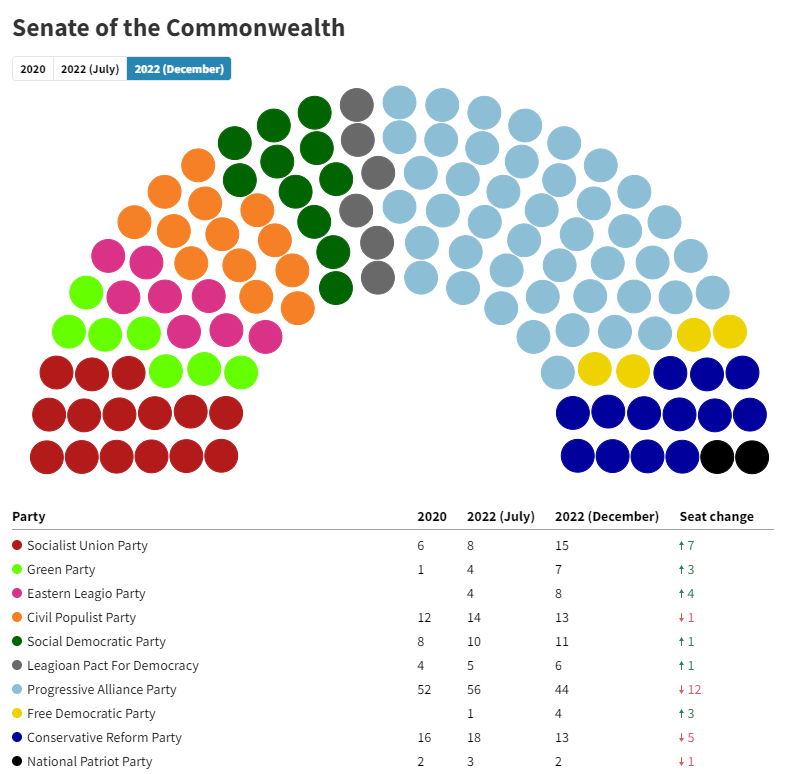
-

Social-Progressives & UPF Complete Coalition Renewal Agreement in Elmane Estate
After the results were announced in the recent election with both the Social Progressives (that includes the Progressive Alliance Party and the Social Democratic Party) and the United Peoples Front (which includes the Socialist Union Party, the Green Party, and the Social Workers Party) concluded their negotiations on renewal the current coalition government for the new session of the National Congres that will begin on January 1st, 2023, till 2025 of the same day at least. The two alliances meet in a conference held in the Elmena Estate, the Presidential Retreat in Arlick, where they discuss the various issues that they want to focus and what special agreements that they wish to implement. The two alliances agreed on Marie Lahaye continuing as Prime Minister, but the Deputy Prime Minister would instead of having the current Deputy Prime Minister Mary Scott replaced with Councilor Wilhelm Duran. In addition, the alliances agreed to divide the positions in the Council of Ministers proportional to their numbers in the House of Councilors with PAP having 5 ministers, SUP having 5, SDP having 2 and the Greens having 2. In addition, in terms of the policies of the coming second Lahaye Ministry, the following policies and measures that would be focused were agreed upon.
-
Creation of an Anti-Corruption Agency
-
Introduction of a progressive tax code system
-
Reformation of healthcare through nationalization with a multiple-payer system
-
Additional Spending Packages as well as schemes that focus on housing, infrastructure, energy (through solar and wind), and modernizing the armed forces (including the investment in drone technology)
-
Stronger (no exceptions practice) regulations on big businesses that tackle workers' rights & conditions, consumer satisfaction, and employment
-
Executive Orders regarding the UNSR will remain in place at the moment
-
Joint Agreement on two replacement candidates for the Supreme Court in 2024
-
Ensure Leagioan Membership into the Treaty of Telum by 2024
After they had agreed to the provisions that the new coalition government will focus on, the two released what the new Council of Ministers will be like for each party with a ministry. Beside each Minister is the name of the person assigned and whether or not they are a member of the National Congress with a C = Councilor and S = Senator. For names that are italicized then it means that they are new to the position.
Progressive Alliance Party
-
Minister of Foreign Affairs: Federica Mogherini
-
Minister of Economy and Treasury: Tom Kelly (C)
-
Minister of Digital Technology: Ramerra Moody (C)
-
Minister of Public Works and Transportation: Shinji Ikari
-
Minister of Research: Dr. Ritsuko Akagi
Social Democratic Party
-
Minister of Agriculture: Kathleen Wood (C)
-
Attorney General: Ethel Hearson (C)
Socialist Union Party
-
Minister of Education: Leo Goodheart (C)
-
Minister of Defence: Mary Scott (S)
-
Minister of the Environment: Harper Dawson (S)
-
Minister of Cultural Affairs: William Vazquez (C)
-
Minister of Social Services: Souma Kayuza (C)
Green Party
-
Minister of the Interior: William Develder (C)
-
Minister of Health: Mark Dime (S)
When asked about her opinion, President Ran Mouri-Kudo mentioned that as the person that appoints persons to three of the Council of Ministers positions with needed approval from the House (mainly referencing the Prime Minister, Deputy Prime Minister, and Attorney General), she felt confident in the stability of the coalition government that will be renewed officially on January 1st, 2023 where its first order of business will be the development of a new national budget by February of the same year. She mentioned that she has no doubt that this coalition will continue to be workable as it has in the past, where the Leagioan voters had shown it by going to the polls this month.
Afterward, news media interviewed the President of the United Peoples Front alliance, Freedonian Diet member James Moriarty, and asked him for his opinion on the agreements and formation of the renewed coalition as he was noticed to be present at the conference in Elmane Estate. He explained that although the alliance he leads did not get a plurality of the vote and seats, they did rise up to a higher standing in Leagioan politics when all the main left-wing parties were divided against each other and show that the alliance does work as intended in Leagioan Elections. "The only thing that we need to do differently when 2024 comes around is be prepared to campaign in a civilized by determined approach" was what Moriarty was quoted in saying to a member of the press.
Meanwhile, other political parties and alliances when they were asked about this renewed coalition government were not so ecstatic. For example, Senator Sam Russel of the Conservative Reform Party (in the Republican Future Alliance) decried the coalition as a communist wave about to stumble upon the Commonwealth by bringing in a wave of tyranny comparable to the UNSR. However, members of the Eastern Leagio Party for example think that it might provide a better opportunity for developing their represented states and might be grateful for the coalition. Others are skeptical and want to see where the renewed coalition goes like members of the Free Democratic Party.
-
-

Civil Populists in Trouble and leave Republican Future Alliance

Not long after the start of the first session of the newly elected National Congress, Chairman and Councilor (Former Governor-General) Mark Gorge stepped down as leader of the Civil Populist Party after its poor performance in the recent National Congress election in December, where said party lost 56 of the 88 seats that it gained back in 2020. The Party had performed so poorly in this election that in a election with a much larger electorate than in 2020, the Civil Populists actually lost about 600,000 which made its defeat more certain and was the cause for the scale of its embarrassing defeat. When polls were conducted as to why the Civil Populists lost so badly this election, many respondents said that it was because of the parties shift to more rightward positions and it being the cause of Mouri-Kudo being unable to govern efficiently.Inside sources said that many members of the Party feel that the future of said party is at risk of collapse and irrelevant due to its positions as well as its recent history. In addition, many members of the Civil Populists in the National Congress suspect that most of the seats and votes that they lost were of the former Left-Wing factions of the party that either went to the Social Democrats and the United Peoples Front Alliance in opposition to the party’s alliance with the Conservative Reformists and Christian Democratic-Republicans. On January 2nd, the Civil Populists temporary leadership committee with its members voted to the leave the Republican Future Alliance by 84% majority. On the same day, the leadership committee also held an election to elect a new chairman for the party itself through the method of instant runoff. Eventually, by the third round, the Party membership choose the famous Senator representing Gopen and Former Internal Affairs Commissioner Candidate Maria Kerstin to lead the party through its uncertain times.
Maria Kerstin was recently re-elected to be Senator for the party in Gopen within a safe margin as the Party did not suffer as much in the Senate side of the election by losing only 1 Senate seat. During her speech for the chairman election, Senator Kerstin said that if elected “she would rebuild the trust and relationship that the party once had with the people by going back to the party’s founding roots back in 1907 where it shifted its stances based on the needs of the people through petitions and sit-ins with the citizens of the commonwealth where it once had the name of the ‘Party of the People.’”
-

National Congress Complete New Budget for 2023
After much deliberation with the Lahaye Government and suggestions by President Mouri-Kudo, re-elected Speaker of the House Shinichi Mouri-Kudo (First Gentleman and husband to the President of the Commonwealth) announced that a budget for the Commonwealth had been agreed upon and passed through the House of Councilors through the needed means provided within the Constitution. In the budget, there was many changes that were put through focusing on areas that the Lahaye coalition government wished to be a priority of the Common Government this year at least. The industry sector of the Commonwealth received a huge cut in funding in this budget from 126 billion Sulias to now 57 billion Sulias. The reasons for this substainal cut was back by the Lahaye government and Minister of the Economy and Treasury Tom Kelly in that the industry of Commonwealth has already shown tremendous growth, but now the people need help not big business. Meanwhile, the percentages of other sectors might have been reduced but their budgets compared to last year have not by much at all.
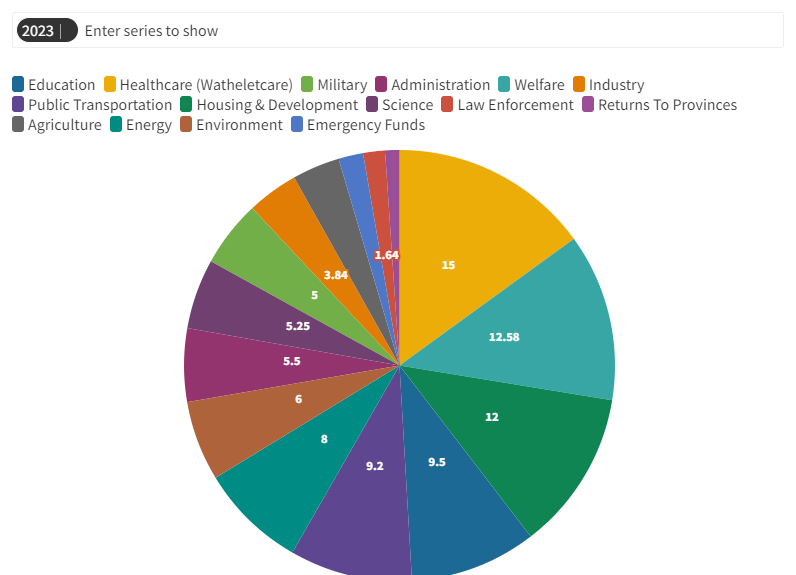
However, the areas that received an outstanding increase in budgets were Healthcare, Housing & Development, and Welfare. For example, in last years budget, the healthcare sector had a budget of just 84 billion Sulias but now it has been dramatically increased to have a budget of at least 223 billion Sulias or 337 billion Euros. Prime Minister Lahaye, during a round of question by the leading opposition party, the Conservative Reform Party, explained that the need of the large increase in healthcare was a means of not only modernizing the healthcare system of the Commonwealth but also to improve the living of Leagioans in the medical support that they received. Many experts agreed that the large increase in healthcare is Lahaye’s steppingstone to nationalizing the health system of Leagio.After debate, a vote was held on the budget with all the government majority of 361 voting in favor of the budget with 172 Councilors in the Opposition voted against the budget, while the opposition from mainly the Conservative Reformists and Christian Democratic-Republicans of 83 voting against and many of the Civil Populists voting against the budget due to disagreements on the need to provide much large spending to energy.
In addition, the budget included the following provisions that were made law for various ministries this year:
• The Ministry of Defense and Ministry of Research shall invest in research as well as develop on drone technology and hypersonic missiles.
• Ministry of Agriculture shall provide agricultural investment on additional subsidies to small farms and farms that are environmentally friendly.
• Ministry of Public Works shall provide additional funding to the rail-line from Tullion to Tokyo and classify it as a top priority project
• Ministry of Social Services shall provide monthly subsides of about 150 Sulia’s to families at or below extreme poverty for living needs
• Ministry of Social Services in coordination with the Ministry of Education shall provide a free school-lunch program to needy schools in the states in Eastern sector of the Commonwealth.
• Ministry of the Environment shall spend at least 5% of its budget for environmental rebuilding programs.
• The Ministry of Education shall provide grants to the construction to 5 schools and a university in Project Wayside
• The Ministry of Education shall spend 3% of its budget on student loan forgiveness.
• The Ministry of Cultural Affairs will introduce a job employment program and training program for minorities that are unemployed for longer than 3 years
• The Ministry of Housing and Development shall spend at least 5% of its budget for the construction of new housing projects in the states of Loors, Kyiv, and Fiowa for the year.
• The Ministry of Research and the Ministry of the Economy & Treasury shall coordinate investment on a program that shall make multi-currency use in stores simple.
• The Ministry of Public Works shall develop a blueprint plan for renovating the capitol sector for residence of the Prime Minister and the new Ministries of the Commonwealth by the end of the year. -
 _
_
Navy Purchases Ships From the United Kingdom
Last week, Prime Minister Lahaye announced that her government was able to secure a deal that was weeks in the making with the United Kingdom as part of a step to modernize the Leagioan Navy. The move comes part of the coalition agreement to modernize the military of the Commonwealth with new equipment and additional focuses on research such as Drone technology and hyper-sonic missiles. The government of Commonwealth in a agreement with the Starmer Government in the United Kingdom, the two countries would work together in developing a new class of frigates and destroyers as well as new drone. As part of a iniative to begin the process of modernizing the Leagioan Navy in particular, the Commonwealth purchased licenses for the following the British Class of Type 45 Destroyers and the Type 23 class Frigates.

(A image of LNS Gopen taken as it sailed out of Port Hilson)

(A image taken of the brand new Alberto Malillos sailing into Port Hilson)
The classes will have all the original British technology but modifications of some of the Leagioan counterparts of ASW detection and radar. The new classes will be named as according to the new ship naming conventions that President Mouri-Kudo authorized, which in this class the Type 45 Destroyers will be called the Gopen Class Destoryers and the Type 23’s are the Abel Ortiz Class Frigates. The Ministry of Defence announced that 3 of the new Gopen Class Destoryers were purchased from the shipyards of the United Kingdom (LNS Gopen, LNS Jullien, LNS Freedonia) and 5 Abel Ortiz Class Frigates were purchased as well (LNS Abel Ortiz, LNS Alberto Malillos, LNS Hyden Cole, LNS Louie Holland, and LNS Noah Valledres).
Lahaye Government Submits Bill for Nationalized Healthcare System
Prime Minister Lahaye with the support of Minister of Health - Mark Dime of the Green Party submitted a bill for a nationalized system of healthcare for the Commonwealth, where it is based on a multiple payer system of health where depending on the occupation, jobs would pay parts of it with the government of different levels of the commonwealth from Federal to local through taxes, and depending on the procedure it is paid by the patient unless it is necessary for the health and safety of the patient. The bill called the National Healthcare Act places all nurses, doctors, and medical personnel as employees of the Common government of the Commonwealth. Furthermore, the Act establishes a regulation that grants the creation of Bureau of Quality Health where it will provide price regulations. In addition, the bill would shift health insurance companies from selling insurance in general to selling benefits that would improve that would cover cosmetic surgery and other non-necessary procedures. The bill is expected to go through the Health and Social Services Committee within the House of Councilors before it goes through a official vote.
-

Federation of Centrist Democrats Aims to Empower Local Communities and Strengthen Fiscal Federalism
The Commonwealth of Leagio has witnessed the birth of a new political alliance called the Federation of Centrist Democrats. The formation of this alliance comes after the Leagioan Pact of Democracy (LPD) and the Hope for Leagio alliance joined forces to create a unified political front.
In the parliamentary election held in December, the LPD gained seats in the Senate but lost all of its seats in the House of Councilors and lost some hold in state legislatures within the Commonwealth. Many of the newly elected officials ran on a platform advocating for localism within their districts and states, indicating a shift away from non-partisan candidates.
Jordan Gauthier, the current president of the LPD, converted the party into an actual political party after realizing that the days of electing non-partisan candidates had long passed Leagio. The party congress ratified a platform that supports new federalism, giving more power to the states and local levels of government.
After adopting the new platform, the LPD began discussions with the Hope for Leagio political alliance (which includes the Free Democratic Party and the Eastern Leagio Party) to become members of the alliance. Senator Carlito Silvestre, the current president of Hope for Leagio representing Tullion, accepted the request and requested the Alliance Committee to consider a potential renaming of the alliance and a new platform that aligns with all members of the alliance.
The newly formed Federation of Centrist Democrats stands on a platform of localism, fiscal federalism, and classical liberalism. The Federation seeks to ensure that power is more evenly distributed between the central government and the provinces, while still allowing for local governments to have a say in the decisions that affect their communities. In addition, the Federation's commitment to classical liberalism means that they aim to limit government intervention in the economy while promoting individual freedoms and civil liberties.
However, there are concerns about the absence of any mention of foreign policy in the Federation's platform. Some political analysts have criticized the Federation's lack of a foreign policy stance, as they believe that it is essential for a country like Leagio to have a clear stance on international relations. They argue that in today's interconnected world, no country can afford to be inward-looking and ignore the global trends and events.
Despite these criticisms, the Federation of Centrist Democrats is expected to continue to grow in size and influence in the coming months. Many Leagioans are looking to the alliance as a new hope for a more prosperous and united future. Only time will tell whether the Federation's localist, fiscally federalist, and classical liberal platform will be successful in achieving its objectives and addressing the challenges facing the Commonwealth of Leagio.
-

Healthcare Nationalized By Congress
The National Healthcare Act, which was recently signed into law by President Mouri-Kudo, has caused a stir in the Commonwealth of Leagio. The new law aims to nationalize the healthcare service and establish a multiple-payer system. It is set to provide access to medical services to the 21% of Leagioans who currently do not have health insurance.The National Healthcare Act is the result of a bill presented by Prime Minister Lahaye and the Minister of Health, Mark Dime. The bill was widely debated in the National Congress, with arguments for and against it coming from both sides of the political spectrum.
Proponents of the bill argue that the current healthcare system is too expensive for many Leagioans and that the new system will provide affordable healthcare to all. They also highlight that the new law includes vision and dental aid, as well as mental health services.
Opponents, however, have voiced concerns about the potential cost of the new system and the impact it could have on private insurers. Some have also raised concerns about the quality of care that will be available under the new system. Leader of the Conservative Reformist Party in the House of Councilors, Councilor Kai Shina argued that the idea of nationalization the healthcare of the Commonwealth strains the budget of the government and takes away power from the states in running their own affairs. These lines are also similar to the Leader of the Federation of Democratic Centrists in the House, Councilor Furuse Mine, who argued that the bill should instead be forcing states to give away power of healthcare to the Common Government and at least offer grants to the Health Ministries in the Provinces to regulate the healthcare system to achieve more efficient results.
Despite these concerns, the bill passed through the National Congress and was signed into law by the President. In the House, the Government majority managed to pass the bill with all 361 Councilors voting in favor while the Conservate side of the House voted against with 140. The Civil Populists in Congress abstained in both houses, while the Senate quickly voted in favor of the Act by 77 Senators. The government has now begun the process of nationalizing the healthcare service in Leagio with Minister of Health – Mark Dime leading the way with the momentous task ahead that will take years to perfect and possibly by the time the task is complete a new government will be in-charge or the next election will take place.
The inclusion of vision and dental aid in the new law has been met with mixed reactions. Some have praised the move mainly those in supportive of the Lahaye Government, stating that dental and vision care are often neglected under traditional healthcare plans. Others that support nationalization healthcare such as the Civil Populist Party, however, argue that the inclusion of these services will increase the cost of the new system for something brand new being attempted within the Commonwealth.
Overall, the National Healthcare Act represents a significant change for the healthcare system in Leagio. It remains to be seen how successful the new system will be, and whether it will achieve its aim of providing affordable healthcare to all Leagioans.
-

KSP and ALUP Labeled Minority Parties
After the recent decision by the Common Electoral Commission (CEC), the African-Leagioan Unity Party (ALUP) and the Karptniz Solidarity Party (KSP) have been granted minority status for the upcoming elections in the list seat category.
This decision by the CEC means that the two parties will be exempt from the 2% voting threshold that is required for political parties to receive seats in the National Congress's House of Councilors. This is a significant victory for both parties, as they will now have a greater chance of representation in the government. The ALUP has been advocating for the rights of African-Leagioans for years, and the granting of minority status is a major milestone in their fight for representation. The KSP, on the other hand, has been working to raise awareness about the struggles of the Karptniz community and the need for greater support.
With the exemption from the voting threshold, the ALUP and KSP will be able to more effectively advocate for the issues affecting their communities, and their voices will be heard in the National Congress's House of Councilors. In addition, this recent decision by the CEC now means that the two parties will be receiving government subsidies to provide for the future success of their parties. This decision has been welcomed by many as a positive step towards a more inclusive and diverse government. The ALUP and KSP have expressed their gratitude to the CEC for their decision and have pledged to continue working towards the betterment of their communities.
In a statement, President Mouri-Kudo said, "I am pleased that the CEC has recognized the importance of ensuring representation for minority communities in our democracy. The granting of minority status to the ALUP and KSP is a step towards a more inclusive political system."
The leader of ALUP, Aisha Mbeki, expressed gratitude for the decision, saying, "This is a victory for the African-Leagioan community. We have long been underrepresented in the political sphere, and this recognition of our party as a minority interest party will ensure that our voices are heard."
Similarly, the leader of KSP, Jakob Wahalla, stated, "The Karptniz people have faced discrimination and marginalization for too long. This decision by the CEC is a positive step towards breaking down barriers and ensuring that our community has a seat at the table."
As the election of 2024 approaches, it will be interesting to see how this decision affects the outcome and whether it will inspire other minority parties to fight for their own recognition and representation.
-

Project Wayside Residents to Vote on Name for New City in Upcoming Referendum
In an unprecedented move, the State government of Arlick has announced that it will hold a referendum on the naming of the new city under Project Wayside during the upcoming EU-Commission Elections. The referendum will allow residents of Project Wayside to vote on the city's name, with options that include the names of New Belfast, Saint Beau, Valladares, Oko, or Masir.
This move has been praised by many as a positive step towards greater democracy and citizen participation in government decision-making. However, it has also been criticized by some who feel that the decision should have been made by elected officials rather than through a public referendum.
The results of the referendum will be determined through the use of the Instant-Runoff voting system, which allows voters to rank their preferences in order of preference. This ensures that the winning option is one that is preferred by the majority of voters. In addition to the naming referendum, the Arlick government has also announced that a non-binding referendum on statehood for Project Wayside will be held. This referendum is part of the coalition agreement between the Social-Progressives and Civil Populist Party coalition government in Arlick.
The Arlick government has expressed hope that the referendums will help to promote greater citizen participation in government decision-making and ensure that the needs and preferences of Project Wayside residents are heard and taken into account. The results of the referendums are expected to be closely watched by political observers both within and outside of Arlick.
-

National Congress Passes New Progressive Tax System
After debate and discussions that involved various agreements between members of Prime Minister Lahaye’s Coliation government, the National Congress was finally able to agree on the passage of a new tax system that would be more progressive and provide more equality of income between Leagioans. The bill that passed the National Congress, on March 27th, called the Progressive Tax Share Act introduced a tax bracket system that Leagioans would pay the Common government outside of the State or Territorial Income Tax that they would have to pay with their year income. The agreed upon brackets was something that had been in constant negotiation between members of the Lahaye Coalition Government and the Finance Committees in both Houses of the National Congress. The Act also included a list of new taxes that would be introduced that repealed or merged other tax acts that were passed since the founding of the Commonwealth. For example, the Progressive Tax Share Act was merged with the Negative Income Tax Act of 1982, where it provides to a people to spend freely as a stimulus if they are below the lowest tax bracket. In the case of the new tax act, the lowest bracket is where single people have to pay 0% of taxes if they make 10,000 Euros or 6,535 Sulias a year.
Tax Income Percentage bracket Income for Single Filing in Euros (Sulias) 0% <10,000 (6,535) 18.5% 10,001 - 29,451 (6,536 - 19,249) 24% 29,452 - 50,369 (19,250 - 32,921) 30% 50,370 - 82,781 (32,922 - 54,105) 33% 82,782 - 98,834 (54,106 - 64,597) 40% 98,835 - 131,625 (64,598 - 86,029) 46.5% 131,626 - 168,325 (86,030 - 110,016) 49% 170,526 - 250,025 (110,017 - 163,415) +2% over 250,026 (163,451) +5% over 500,000 (326, 797) Most of the taxes that were repealed were of the more of the Pro-Big Bussiness taxes during the Presidency of Alberto Malillos (1994-2000). In these taxes passed by Lahaye, the Captial Gains Tax, Corporate Tax, Excessive Profits Tax was raised by over 10 to 15% or in the case of the Excessive Profits Tax then a up to 38% increase. However, the Progressive Tax Share Act also included new taxes that were considered controversial by the opposition parties which were a Expatriation Tax for persons that wish to emigrate outside of the Commonwealth that to is also progressive with its highest rate being at 42.6% for person with a income of over 150 million Euros or 229.5 Million Sulias. Members in the Conservative Reform Party and in the more old-guard as well as conservative members of the Progressive Alliance Party (the party of President Mouri-Kudo and Prime Minister Lahaye) opposed calling it a move of attacking the free market of business within the Commonwealth. Some of the taxes that were implemented into the Act can even be raised to certain level by state governments when passing their own taxation legislation. Another complaint that was raised by the opposition, mainly those in the Conservative Reform Party, was the idea that the tax rates where too high of a burden on the population of the Commonwealth. For example, Councilor Tristan Fortier (also a member for the party in the House Finance Committee from where the bill started) argued that the flat tax rate that was started by President Mallilos provided more food to the table for poor working-class families of the Commonwealth. However, President of the United Peoples Front Alliance James Moriarty sent a retort on television yesterday during a conference with the Commonwealth Steel Workers Union by saying that "Councilor Fortier seems to have forgotten that the flat tax rate started by Malillos had hurt the eastern states or territories at the time as the Flat Tax Act prevented States and Territories from passing laws that allowed them introducing their form of a progressive system to pay for their governments, which had hurt the families of union workers and common citizens in the east as the flat tax did not account for lower-income situations." Moriarty had also made an additional retort in that the flat tax had actually made big businesses in the commonwealth stronger and have more power to the point that it require Mouri-Kudo to pass the Labor Union Civil Rights Act a couple of years ago.
Tax Type Rate Sales 2% (can go up to 6% by Provinces) Corporate 38.5% Payroll 3.4% (can go up to 5.1% by Provinces) Capital Gains 29.4% Expatriation 42.6% Excessive Profits 40% Alcohol 8.2% (can go up to 12% by Provinces) Vat 2% (can go up to 6% by Provinces) The Progressive Tax Share Act passed the National Congress where in the House of Councilors had 295 Councilors Approving the bill and 238 against the bill with some being from Mouri-Kudo’s own party; The Senate approved the bill with 73 Senators For and 50 Against it (with a couple too being from Mouri-Kudo’s Party). The Fact that some of Congressmen in the PAP have brought recent concerns that the Progressive Alliance Party is at risk of fragmenting and shattering the majority that the Lahaye government currently has. However, President Mouri-Kudo expressed reassurance that there is no sign of serious conflict with members within her own party. "Although, it is understandable that some might feel that there is fragmentations happening with the Party, " The President said in a conference with the press after signing the act yesterday, "but it is common for disagreement within the interiors of larger parties to occur. The party took their opinions but was unable to meet the needs of every member in both houses and so we have the results that we saw on the 27th of March. However, the members that voted against the party made reassurances that they had no intention to split with the party that they have benefitted from at this point. We will try to accommodate for them better in the future as a sign of understanding."
-


(MInister Tom Kelly at the annual Commonwealth Economic Forum last weekKudonomics: Bold Government Intervention or Recipe for Disaster? Congress Divided on Economic Policies
In a interview recently at the annual Commonwealth Economic Forum in Dilaton, Condris, Minister of the Economy and Treasury Tom Kelly explained that the economic policies that he termed as ‘Kudonomics’ have been driving the economy of the Commonwealth of Leagio to new heights. The 45 year-old minister and Councilor representing the southern eastern section of Gopen since 2003 backed his statement by illustrating how the GDP of the commonwealth has risen by 250% of what it was before the inauguration of President Ran Mouri-Kudo after two year period, where the Country has a strong economy that can efficiently compete against other European nations economically. When compared to the previous president of Kenith Lifejumper, the GDP has see more growth with yearly salaries rising by at least 30,000 Sulias. Furthermore, Minister Kelly stated that in his opinion the policies of Mouri-Kudo involving the implementation of a progressive tax system, focused attacks on reducing the power of big business, increased government spending as a way to increase GDP with development for eastern provinces, and the creation of a ethics code for business to follow was very effective and successful.
The term of Kudonomics has been on the rise in the commonwealth through social media lately that has helped to improve the image of the current president where it involves a level of government intervention in the economy that had not been seen since the days of President Maxime Gauthier, who implemented his New Deal program during the economic hard times of the 1950s. The level of intervention when compared to President Lifejumper in particular is more aggressive in where Mouri-Kudo and Lahaye implement large-scale government spending in infustrature that went above even Lifejumper’s Eastern Economic Development Act which had the spending of 4 billion sulias that were saved to improve the infrastructure of the eastern provinces during a time of economic uncertainty after the Commonwealth joined the European Union.
However, many members of the National Congress that are in opposition to the Lahaye Government argued by explaining that the increase spending had caused a large decrease in the savings and amount of disposable income that the common Leagioan has in their pockets while at the same time the cost of living within the Commonwealth has risen by a large amount as well, which will at some point in the future will come back and do even more damage to the economy that will reverse all the results and effort of the Lahaye government.
In response to especially from the criticism of Councilor James Hilda from Huttson and of the Conservative Reformistists (who made such comments in the floor of the House of Councilors during its weekly 2 hour period of debating the policies of the government and the President), Economics Professor of the University of the Commonwealth William Heasa explained that “although, increased cost of living may result in lowered disposable income for some Leagioans, which could have negative effects on consumer spending and economic growth in the long term. The benefits in the long-term will start to outweigh them in the future at an even further state.” Another comment of concern from members of Congress was that Senator Maria Kerstin, herself, who issued a statement of concern that these large scale and expensive development programs will lead to a level of Debt that the Government will probably need to burrow from the EU and other European powers in order to finance the programs and projects completion.
Professor Heasa continued to explain that the effects of Kudonomics in how the benefits will still out weight the costs in that:
• By focusing on development for eastern provinces, Kudonomics may help to improve infrastructure in those regions, which could have long-term benefits for the economy.
• The progressive tax system implemented under Kudonomics may help to reduce income inequality in the long term, which could have positive effects on social and economic stability.
• By implementing a progressive tax system and reducing the power of big business, Kudonomics may help to create a more stable economic environment in the long term. -

Ministry of Environment Launches Innovative Recycle Payment Scheme to Promote Sustainability
In a groundbreaking move towards fostering environmental sustainability, the Ministry of Environment has introduced a pioneering Recycle Payment Scheme aimed at incentivizing and rewarding individuals and communities for their recycling efforts. This initiative, a first of its kind in the Commonwealth, is set to revolutionize waste management practices and create a culture of responsible consumption.
Under the Recycle Payment Scheme, individuals and households will be encouraged to participate actively in recycling programs by providing monetary incentives for their recycling contributions. The scheme aims to motivate citizens to separate and recycle their waste effectively, reducing the burden on landfills and promoting the circular economy.
Through this scheme, citizens will receive a designated monetary value for each unit of recyclable material they properly dispose of, such as paper, plastic, glass, and metal. The Ministry of Environment will collaborate with local municipalities and recycling centers to implement an efficient tracking and reimbursement system. Participants will be able to claim their rewards through various methods, including mobile applications or designated collection points.
The Recycle Payment Scheme not only serves as a financial incentive for individuals but also fosters a sense of responsibility and environmental consciousness. By actively participating in recycling initiatives, citizens will contribute directly to the preservation of our natural resources, reduce greenhouse gas emissions, and combat the detrimental effects of waste accumulation on our ecosystems.
This initiative aligns with the Ministry of Environment's broader goals of achieving sustainable development and reducing the carbon footprint of our nation. The Recycle Payment Scheme aims to significantly increase recycling rates, thereby reducing the need for raw materials extraction and reducing the environmental impact associated with waste management.
The introduction of the Recycle Payment Scheme reflects a proactive and forward-thinking approach by the Ministry of Environment. By encouraging citizens to play an active role in waste reduction and recycling, the scheme aims to create a paradigm shift towards a more sustainable and environmentally conscious society.
The Ministry of Environment invites citizens, local municipalities, and businesses to actively participate in this transformative initiative. Together, we can shape a greener future, where recycling becomes an integral part of our daily lives, benefiting both our environment and future generations.
By introducing the Recycle Payment Scheme, the Ministry of Environment sets a precedent for innovative environmental policies that prioritize sustainability and create a positive impact on our society. It is a significant step towards a more circular and responsible approach to waste management in our nation.
-

Treaty of Telum Membership Bill enters National Congress with heated debate
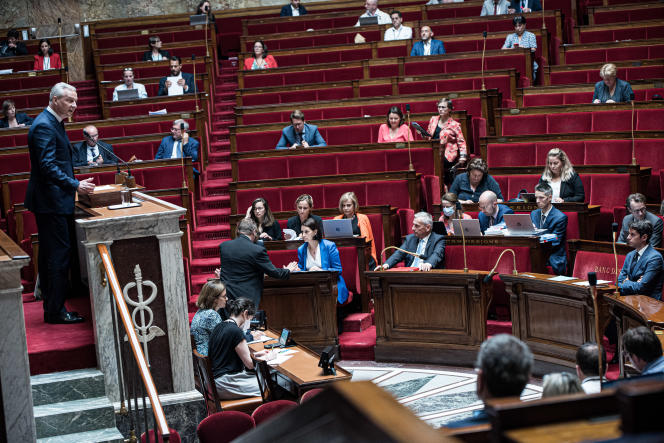
This afternoon with much coalition between the different parties of Prime Minister Lahaye’s government, Minister of Foreign Affairs Federica Mogherini submitted a bill to the Foreign Affairs Committee in the House of Councilors with a additional copy being submitted to the Sentate. In this bill was a bill of ratification of the Treaty of Telum should its member nations welcome Leagio into the Alliance. However, the road for ratification will be hard for at least Mouri-Kudo and Lahaye in their party to get in line with the Treaty. Almost every member of the United People’s Front Alliance within both houses of the National Congress have stated that they would vote in favor of a Leagioan Ratification of the Treaty of Telum as well as all the members of the Social Democratic Party. However, the same cannot be said of the members within Prime Minister Lahaye and President Mouri-Kudo’s party (Progressive Alliance Party), where the more conservative flank of the Party have strong hesitations and in multiple occasions have threaten to vote against the Treaty’s ratification. 12 Senators for the Progressive Alliance Party have stated that they are against the idea of a ratification. The main reason that they have issued that they favored the policy of de-facto neutrality within the European Union, which has been a policy started in the last months of the Lifejumper Presidency. However, many members of the United People’s Front Alliance that policy had since failed once President Lifejumper managed to get the ratification of now expired Treaty of Tullion with the Kingdom of Ritzmag.
Even Governor-General Kaito has raised hesitation to allow the bill of ratification to pass the Senate as he has the power of President of the Senate. However, the issue is that if Prime Minister Lahaye can get enough support within the House of Councilors, then she might be able to get the Bill passed through the House if the Senate does not respond have the House pass the bill again with the two-thirds majority vote but she would need support of all the members of the Progressive Alliance Party in the House of Councilors to pass it. Rumors have been running from sources within the Executive Mansion that President Mouri-Kudo is currently meeting with the dissenting members of the Progressive Alliance Party to come to a compromise in resolving the issue smoothly.
Other rumors are running that members of the Foreign Affairs Committee within both House and Senate are currently wanting to issue a request of testimony on Spanish President Jesus Aguilar to represent the Treaty of Telum Alliance. A request of testimony by a Congressional Committee does not hold criminal investigation on what a committee is studying or investigating, merely it is a request by the Committee or Committee’s to provide information on a topic relating to a bill being debated within the National Congress committee if possible. The resolution is merely a request by the committee to provide information to help the committee to obtain viewpoints on an issue of debate from experts or witnesses. Pundits believe that the reasoning for the resolution of testimony is one of the holdouts of the many members of the National Congress is that they have highlighted the time of Elizabeth Truss comment of EU law being used as Toilet Paper. This comment made by the former Spanish Minister in Aguilar’s Cabinet was being in relation to heightened tensions that were involved in the debate within the EU Council over the Navigation of Seas Act that occurred last year, which many opponents to the Treaty of Telum used in connection whenever the discussion of Leagioan membership into the treaty is ever brought up into the floor. However, supporters of Leagioan membership stated that the Spanish President rectified the issue by removing Truss from her position had apologized for the statement made by the Former Minister. But same people that mentioned the rumors state that the resolution of testimony is unlikely to come through due to the recent news that President Aguilar will be stepping down from his position.
The initial debates within the Foreign Affairs Committees of the two houses in the National Congress are expected to last for at least till next week, where they will decide on whether or not to allow it to proceed for the debate in the main floor of either of their chambers.